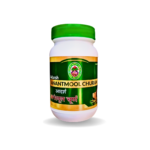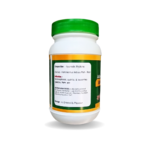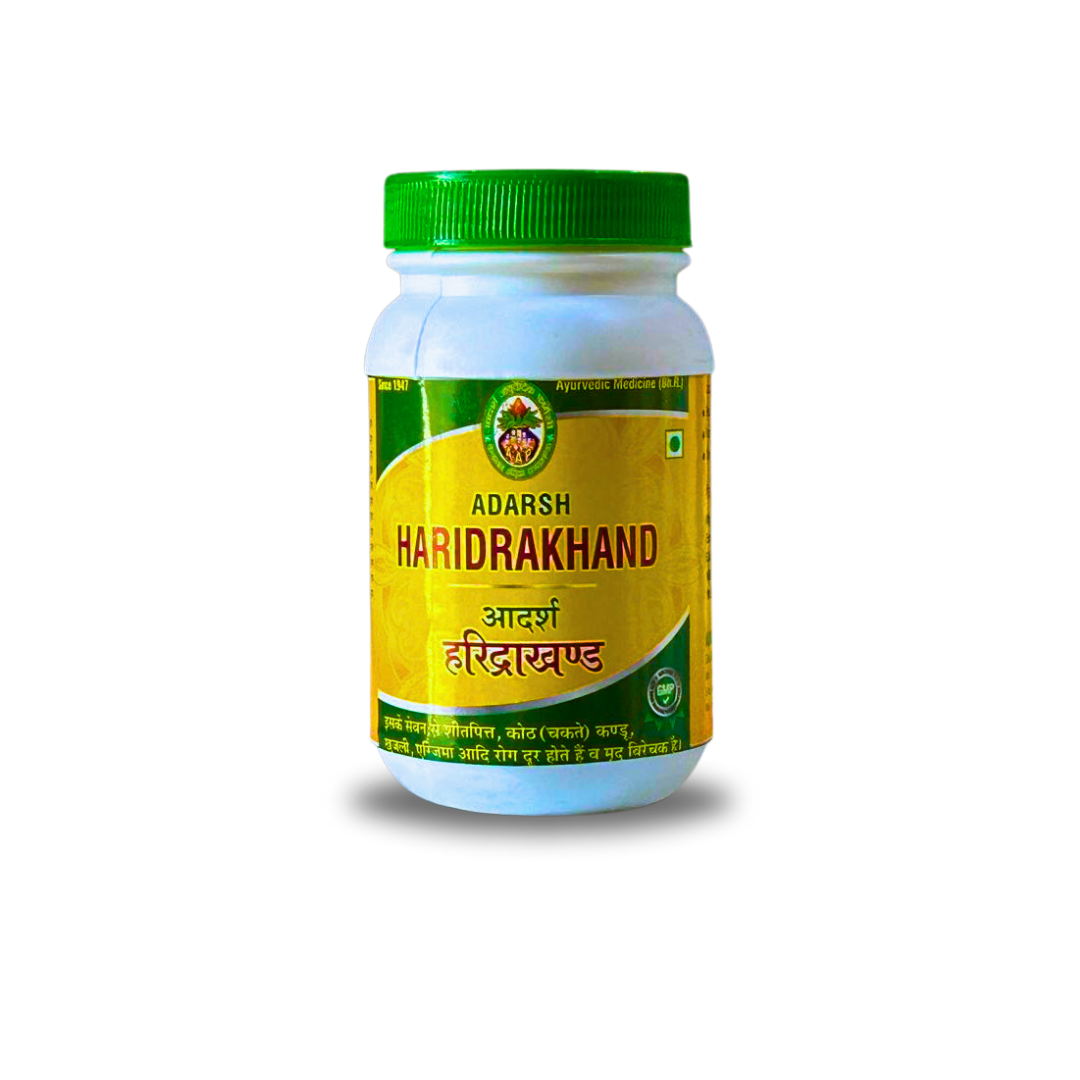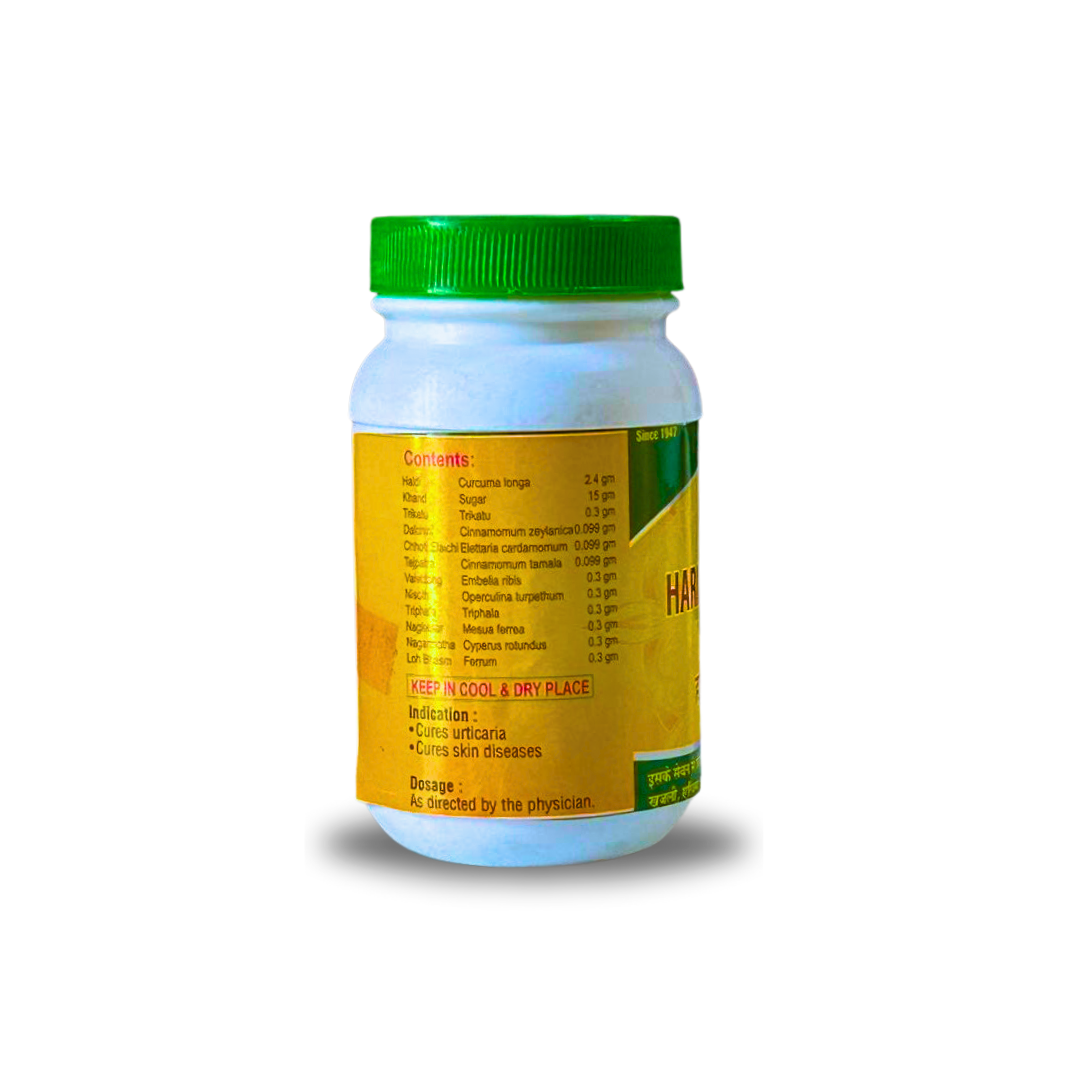Anantmool Churan
₹100
Anantmool, also known as Sariva, is an Ayurvedic herb derived from the roots of Hemidesmus indicus plant. The roots of this plant are used for medicinal purposes in Ayurveda.
According to the Ayurvedic Medicine book, Anantmool root is traditionally used to treat various health conditions such as hydronephrosis, syphilis, and leucorrhea. Hydronephrosis is a condition where urine accumulates in the kidneys, causing them to swell. Syphilis is a sexually transmitted infection that can cause long-term health complications if left untreated. Leucorrhea is a condition characterized by vaginal discharge.
- Delivery & Return
Delivery
We ship to all over the world. All orders are shipped with a UPS tracking number. Always free shipping for orders over 1000. During sale periods and promotions the delivery time may be longer than normal.Return
Adarsh Ayurvedic Pharmacy will accept exchanges and returns of undamaged box within 30 days of the date of purchase (14 days during the sales period), on presentation of the original till receipt at any store where the corresponding collection is available within the country of purchase. Your return will usually be processed within a week to a week and a half. We’ll send you a Return Notification email to notify you once the return has been completed. Please allow 1-3 business days for refunds to be received to the original form of payment once the return has been processed.Help
Give us a shout if you have any other questions and/or concerns. Email: aapdeepak.hdr@gmail.com Phone: 9897902760
Anantmool, also known as Sariva, is an Ayurvedic herb derived from the roots of Hemidesmus indicus plant. The roots of this plant are used for medicinal purposes in Ayurveda.
According to the Ayurvedic Medicine book, Anantmool root is traditionally used to treat various health conditions such as hydronephrosis, syphilis, and leucorrhea. Hydronephrosis is a condition where urine accumulates in the kidneys, causing them to swell. Syphilis is a sexually transmitted infection that can cause long-term health complications if left untreated. Leucorrhea is a condition characterized by vaginal discharge.
Anantmool root is believed to have anti-inflammatory, antiseptic, and diuretic properties that may help reduce inflammation, fight infections, and promote urine flow. It is commonly used in Ayurvedic medicine as a natural remedy for various health conditions, including those mentioned above.
However, it is important to note that herbal remedies should be used under the guidance of a qualified Ayurvedic practitioner. They can recommend the appropriate dosage and duration of treatment based on individual needs and health conditions.
| Weight | 250 g |
|---|---|
| Dimensions | 14 × 12.5 × 8.5 cm |
| Weight | 100gm |
Based on 0 reviews
|
|
|
0% |
|
|
|
0% |
|
|
|
0% |
|
|
|
0% |
|
|
|
0% |
Related Products
Chandanbala Lakshadi Tail is typically applied topically to the affected joint areas and gently massaged into the skin. The frequency and duration of use can vary based on individual needs and the guidance of a qualified healthcare professional. It is important to note that like all herbal remedies, Chandanbala Lakshadi Tail may cause allergic reactions or other side effects in some individuals, and should be used with caution.
Chandanbala Lakshadi Tail is an Ayurvedic herbal oil made from a blend of several herbs, including Chandan (Sandalwood), Bala (Sida cordifolia), and Laksha (Laccifer lacca). The oil is commonly used in Ayurvedic medicine to help relieve joint pain and inflammation.
The components of Adarsh Tamrakalpam is enriched to cure all types of hepatitis.
Adarsh Tamrakalpam has curative results in liver diseases.
Adarsh Tamrakalpam cures pitta dosha stomach aches and ulcer
Dr. Deepak suggests Adarsh Tamrakalpam is many folds effective if consumed with Adarsh Mednasak Godan vati. The combination also detoxifies the liver and cures Splenomegaly and hepatitis.
Buy 10 get one free.
Selflife: three years.
Eladi Vati is typically taken orally, and the recommended dosage and duration of use may vary depending on the individual’s condition and overall health. It is important to consult with a qualified Ayurvedic practitioner before using this or any other herbal remedy.
Although Eladi Vati is generally considered safe when taken as directed, some individuals may experience side effects such as stomach upset, allergic reactions, or interactions with other medications. It is important to speak with a healthcare provider before using this or any other herbal remedy, especially if you are pregnant, breastfeeding, or have any underlying health conditions.
Out of stock
Maha Narayan Tail is typically applied topically to the affected area and gently massaged into the skin. The frequency and duration of use can vary based on individual needs and the guidance of a qualified healthcare professional. It is important to note that like all herbal remedies, Maha Narayan Tail may cause allergic reactions or other side effects in some individuals, and should be used with caution.
Maha Narayan Tail is an Ayurvedic herbal oil that is made from a blend of several herbs, including Bala (Sida cordifolia), Ashwagandha (Withania somnifera), and Manjistha (Rubia cordifolia). This oil is commonly used in Ayurvedic medicine for the treatment of joint pain, muscle pain, and stiffness.
Prawal Panchamrit is believed to have antacid and digestive properties, which can help in the treatment of acidity, heartburn, indigestion, and gastritis. It is also believed to improve appetite, promote digestion, and reduce inflammation in the stomach lining.
However, it is essential to note that the use of Prawal Panchamrit should be done under the guidance of a qualified Ayurvedic practitioner. Overdose or incorrect usage can cause adverse effects like constipation, stomach upset, and nausea. It is also not recommended for pregnant and lactating women and people with liver or kidney problems.
Bhringraj tail is typically applied to the scalp and hair, left for a period of time (usually 30 minutes to several hours), and then washed out with shampoo. The frequency and duration of use can vary based on individual needs and the guidance of a qualified healthcare professional. It is important to note that like all herbal remedies, Bhringraj tail may cause allergic reactions or other side effects in some individuals, and should be used with caution.
Bhringraj tail is an Ayurvedic herbal oil made from Bhringraj (Eclipta alba), a plant known for its hair growth promoting properties. The oil is believed to help nourish and strengthen the hair, prevent hair loss, and promote the growth of healthy hair.
Swadukantak is typically taken in tablet form, and the recommended dosage and duration of use can vary based on the individual’s specific health needs and the guidance of a qualified healthcare professional. It is important to note that like all herbal remedies, Swadukantak may interact with certain medications or have potential side effects in some individuals.
Swadukantak is an Ayurvedic herbal formula used to support healthy digestion and promote overall gastrointestinal health. It is a blend of several herbs, including Chitrak (Plumbago zeylanica), Pippali (Piper longum), and Ajwain (Trachyspermum ammi).
Pathyadi Kwath is an Ayurvedic herbal decoction made from a blend of several herbs, including Haritaki (Terminalia chebula), Bibhitaki (Terminalia bellirica), and Shunti (Zingiber officinale).
According to Ayurvedic principles, Pathyadi Kwath is believed to help support respiratory health, particularly in cases of cough and cold. It is also commonly used to support digestive health, promote healthy metabolism, and alleviate symptoms associated with inflammation.
According to Ayurveda, Khadiradi Vati is used to balance the Kapha and Pitta doshas in the body. It is commonly used for the treatment of dental problems such as toothache, gingivitis, and bad breath. It is also used to improve digestion and treat stomach disorders.
Khadiradi Vati is known for its anti-inflammatory and antibacterial properties. It helps in reducing inflammation and pain in the gums, and also helps in killing harmful bacteria in the mouth. It is also beneficial for treating skin disorders like acne and eczema.
Haridrakhand (also spelled as Haridra Khanda) is an Ayurvedic herbal formulation that is commonly used in traditional Indian medicine. It is a powdered mixture of various herbs and spices, with turmeric (haridra in Sanskrit) being the primary ingredient.
Some of the key ingredients in Haridrakhand include turmeric, ginger, black pepper, cardamom, cinnamon, and honey. These ingredients are believed to have a range of health benefits, such as reducing inflammation, improving digestion, boosting the immune system, and promoting healthy skin.
Astak Loh Mandur is believed to work by improving the production of red blood cells and increasing the level of hemoglobin in the blood. It is also thought to have a detoxifying effect on the liver and improve liver function, thereby improving overall health and well-being.
As with any Ayurvedic medicine, it is essential to consult a qualified Ayurvedic practitioner or healthcare professional before using Astak Loh Mandur to ensure its safe and effective use. The dosage and duration of treatment may vary depending on the individual’s condition and other factors.
Badam Pak is made by grinding almonds into a fine powder and mixing it with sugar, ghee (clarified butter), and a variety of other herbs and spices, such as saffron, cardamom, and cinnamon. The ingredients are then cooked together over low heat until they form a thick paste.
According to Ayurvedic tradition, Badam Pak is believed to have a nourishing effect on the brain and nervous system, as well as to improve digestion and support overall vitality. It is also believed to have a calming effect on the mind, making it a popular remedy for stress and anxiety.
































Reviews
There are no reviews yet.